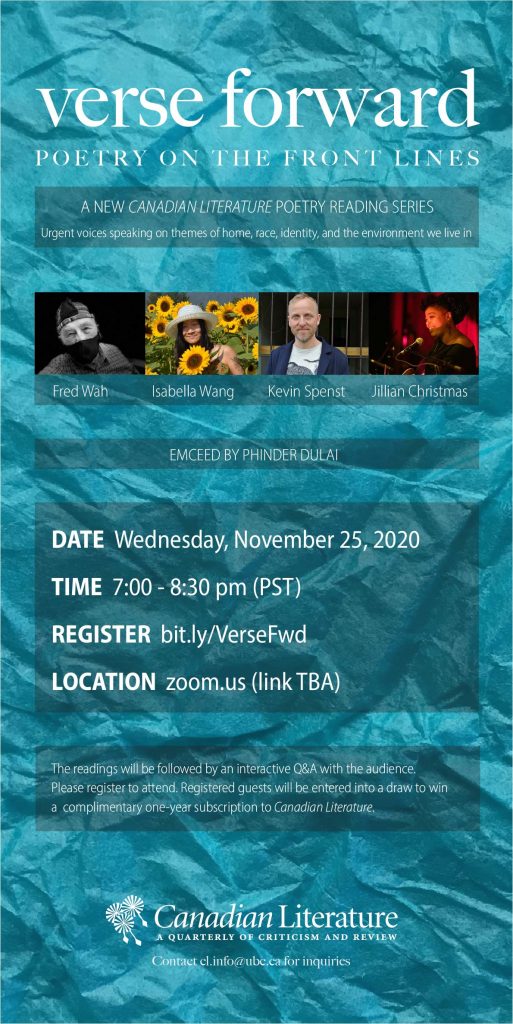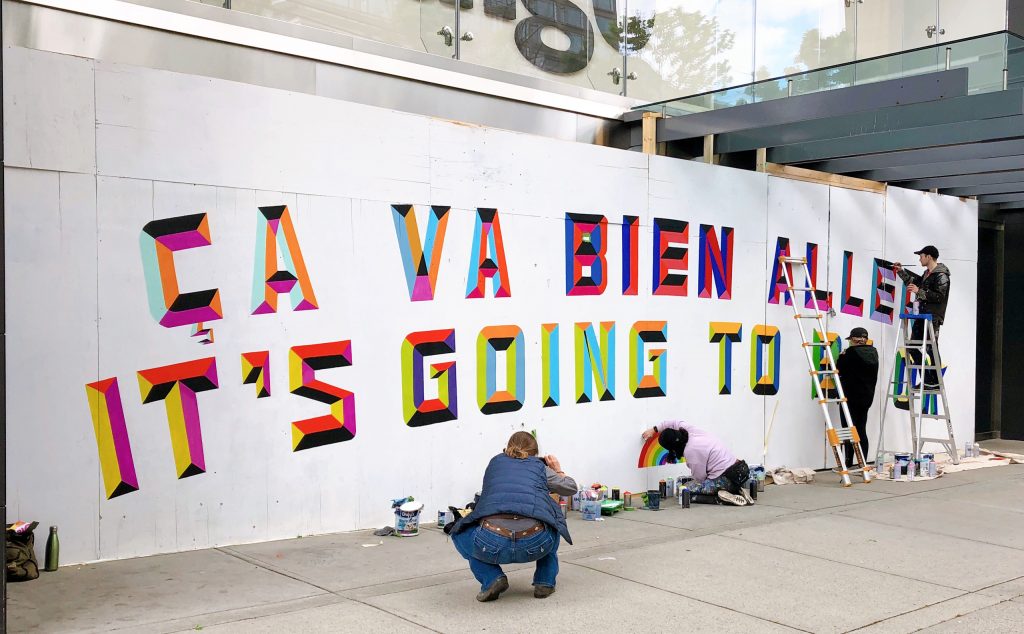Verse Forward: Poetry on the Frontlines: Author Spotlight—Fred Wah
November 17, 2020
 BC poet Fred Wah’s most recent project is Music at the Heart of Thinking: Improvisations 1-170, published by Talonbooks in 2020. Also recently, he has published a collaboration with Rita Wong about the Columbia River, beholden: a poem as long as the river (Talonbooks, 2019), and contributed to the collaboratively created interactive website High Muck a Muck: Playing Chinese, An Interactive Poem (http://highmuckamuck.ca/). He lives in Vancouver and on Kootenay Lake.
BC poet Fred Wah’s most recent project is Music at the Heart of Thinking: Improvisations 1-170, published by Talonbooks in 2020. Also recently, he has published a collaboration with Rita Wong about the Columbia River, beholden: a poem as long as the river (Talonbooks, 2019), and contributed to the collaboratively created interactive website High Muck a Muck: Playing Chinese, An Interactive Poem (http://highmuckamuck.ca/). He lives in Vancouver and on Kootenay Lake.
Come hear Fred Wah speak on November 25, 2020 at 7:00p.m. (PST) at the inaugural event of Canadian Literature’s new reading series, “Verse Forward: Poetry on the Front Line.” Register here bit.ly/VerseFwd!
Verse Forward: Poetry on the Frontlines: Author Spotlight—Isabella Wang
November 10, 2020
 Isabella Wang is the author of two poetry collections, On Forgetting a Language (Baseline Press, 2019) and Pebble Swing (Nightwood Editions, forthcoming 2021). Her poetry and prose have appeared in over thirty literary journals and are forthcoming in four anthologies. She is the Editor for issue 44.2 of Room magazine.
Isabella Wang is the author of two poetry collections, On Forgetting a Language (Baseline Press, 2019) and Pebble Swing (Nightwood Editions, forthcoming 2021). Her poetry and prose have appeared in over thirty literary journals and are forthcoming in four anthologies. She is the Editor for issue 44.2 of Room magazine.
Come hear Isabella Wang speak on November 25, 2020 at 7:00p.m. (PST) at the inaugural event of Canadian Literature’s new reading series, “Verse Forward: Poetry on the Front Line.” Register here bit.ly/VerseFwd!
Verse Forward: Poetry on the Frontlines: Author Spotlight–Kevin Spenst
November 3, 2020
 Kevin Spenst is the author of Ignite, Jabbering with Bing Bong, and Hearts Amok: A Memoir in Verse (Anvil Press) as well as over a dozen chapbooks. He teaches Creative Writing at Vancouver Community College and lives in Vancouver on unceded Coast Salish territory with the love of his life Shauna Kaendo.
Kevin Spenst is the author of Ignite, Jabbering with Bing Bong, and Hearts Amok: A Memoir in Verse (Anvil Press) as well as over a dozen chapbooks. He teaches Creative Writing at Vancouver Community College and lives in Vancouver on unceded Coast Salish territory with the love of his life Shauna Kaendo.
Come hear Kevin Spenst speak on November 25, 2020 at 7:00p.m. (PST) at the inaugural event of Canadian Literature‘s new reading series, “Verse Forward: Poetry on the Front Lines.” Register here bit.ly/VerseFwd!
Verse Forward: Poetry on the Frontlines
October 23, 2020
Join us for the launch of “Verse Forward: Poetry on the Front Line,” a new reading series hosted by Canadian Literature. For more than six decades, the value of creative voices and publishing original poetry have been central to the journal’s critical discourse and deep commitment to Canadian writing. In the context of a global pandemic in which our various publics are at once physically distanced and virtually linked, the separation of our familiar literary communities prompts alternative connectivities and new ways of speaking creatively and critically together. What part can poetry play in articulating the complexities of our conditions in a world that appears to be transforming both too much and not enough? The “Verse Forward” reading series seeks to sustain literary community by amplifying Canadian poetry’s ongoing vitality on the front lines as we interrogate and imagine anew the conditions and locations we inhabit. The inaugural event in the series features a diverse panel of both established and emerging voices speaking on themes of home, race, identity, and the environments we live in. The original poems presented at the reading will be published in an upcoming issue of Canadian Literature.
This event will be hosted on Zoom and is free and open to all. Readings from the four speakers will be followed by an interactive audience Q&A. Registration is required to access the virtual meeting. Registration link provided below.
All registered audience members will be entered into a draw to win a free one-year subscription to Canadian Literature.
Poet Panelists
- Fred Wah
- Kevin Spenst
- Isabella Wang
- Jillian Christmas
Phinder Dulai (emcee)
Event Info
- Date: Wednesday, Nov. 25, 2020
- Time: 7:00-8:30pm (PST/Pacific Standard Time)
- Location: Zoom.us (Link TBA)
- (please register at bit.ly/VerseFwd)
This virtual event will be hosted by Canadian Literature, located at UBC on the traditional, ancestral, and unceded territories of the Musqueam people.
Contact cl.info@ubc.ca for inquiries.
Farewell & Welcome
October 14, 2020
On July 2, 2020, Christine Kim officially became the new editor of Canadian Literature. We look forward to the new directions the journal will be taking under her guidance over the next five years, and congratulate her once more on the appointment. Welcome to our new editor, Christine Kim!
Christine follows in the footsteps of Laura Moss. In July of this year, Laura finalized seventeen years of relentless dedication to the work of Canadian Literature–eleven years as reviews editor and six-and-a-half years as acting editor and then editor in chief. In her final editorial for the journal, “111 Days of COVID and Reading,” she writes about her last day at the office:
And now I am done. I have such mixed emotions: grateful to have had the opportunity to work on such a publication for so long, very proud of the work we accomplished, sad to be leaving the CL team, ready to move on, relieved not to have the weight on my shoulders, nostalgic already. All good things, etc. Bye CanLit.
We at the journal could not be more grateful to Laura for all she has done to keep our publication running. Now acting as Associate Dean of Students in the Faculty of Arts at the University of British Columbia, we wish her the best in all her future endeavours. Goodbye Laura, you will be missed.
Call for Papers for a Special Issue on “The Vietnam War and its Afterlife in Canadian Literature”
October 9, 2020
Canadian Literature seeks contributions for a guest-edited special issue on “the Vietnam War and its Afterlife in Canadian Literature.” As a descriptor, “the Vietnam War” signifies differently across spatial, temporal, and geographical boundaries. Some of its variants, metonymies, proxies, “sideshows,” and “postscripts” include: the American War in Vietnam, the Second Indochina War, the Cold War in Southeast Asia, the Secret War in Laos, the U.S. bombing of Cambodia, and the Cambodian Genocide. Collectively, these asymmetrical wars of empire contributed to the suffering of Vietnamese, Cambodian, Laotian, and Hmong people on a scale that Michel Foucault described in 1979 as “unprecedented in modern history.” These wars also disproportionately enlisted the labour of Black, Indigenous, and brown bodies to fight on the frontlines of the war in the name of securing the extractive economies of Southeast Asia for U.S.-led global capitalism.

Duffin’s Donuts in Vancouver, BC, run by former Cambodian refugees.
Canada’s involvement in the Vietnam War was marked by both complicity with and resistance to empire. On the one hand, Canada sent thousands of troops to Southeast Asia, provided the U.S. military with war material, and allowed the testing of chemical weapons on indigenous lands in Canada. On the other hand, Canada offered sanctuary to 30,000 U.S. war resisters and 60,000 Southeast Asian refugees, more refugees per capita than any other nation in the world. At local levels, Canadian groups mobilized in support of Southeast Asian refugees (e.g. Operation Lifeline) while others (the majority of the Canadian public polled at the time) were against the government’s asylum policies.
How might we begin to reconcile Canada’s humanitarian image of benevolence with its complicitous actions? How do the literary and cultural works that have been routed through Canada—including Denise Chong’s The Girl in the Picture, Kim Thuy’s Ru, Vincent Lam’s The Headmaster’s Wager, Madeleine Thien’s Dogs at the Perimeter, Dionne Brand’s What we All Long For, Johanna Skibsrud’s The Sentimentalists, Philip Huynh’s The Forbidden Purple City, Kathryn Kuitenbrouwer’s All the Broken Things, Tian Veasna’s Year of the Rabbit, Greg Santos’s Ghost Face, FONKi’s The Roots Remain, Jacqueline Hoàng Nguyễn’s The Making of an Archive, and Souvankham Thammavongsa’s How to Pronounce Knife, among others—engage with the recurring presence of the Vietnam War and its afterlife? To what extent does the Vietnam War as an imperial formation offer possibilities for rethinking the paradigm of Canadian literature as a field? How might this rethinking coalesce alongside contemporary movements in Asian, Black and Indigenous studies in Canada?
In particular, the journal welcomes bipoc, de-colonial, feminist, queer, trans, transpacific, and/or critical refugee studies approaches. Essays and contributions that blend the creative and the critical, as well as the theoretical and the autotheoretical, are welcomed and encouraged. Contributions need not be limited to the study of “literature” in its conventional sense.
Possible essay topics may include, but are not limited to, the following as they intersect with the theme of the Vietnam War and its Afterlife in Canadian Literature, broadly conceived:
- The Vietnam War (or variant) as an unsettling method or analytic
- Southeast Asian refugee memories, lifeworlds, and knowledges
- Black / Indigenous / Asian formations of the Vietnam War
- Soldiering, empire, and Canada as “minor empire”
- Militarism, slow violence, and ecological aftermaths
- Sponsorship, humanitarianism, and humanitarian violence
- Canadian civility, complicity, and “quiet complicity”
- Migrant affects: gratitude, anger, empathy, apathy
- Aesthetics, form, multimedia, and art
- Narratives of “good” and “bad” refugees
- Resettlement in the rural versus the urban
- French Indochina-Quebecois-Canada triangulations
- Parallel imperial formations (e.g. wars in Korea, Lebanon, Somalia, Syria)
- Refugee routes via militarized spaces (e.g. camps in the Philippines, Hong Kong, Canadian bases)
- Spaces of refuge and carcerality: boat, camp, asylum, prison, deportspora
- Sanctuary in relation to health, disability, and neurodiversity
- Refugee patriots and complicities
- Military industrial complex and war machines
- Food cultures, memory, and community
- Anti-racist, anti-colonial, bipoc solidarities and futures
All submissions to Canadian Literature must be original, unpublished work. Essays should follow current MLA bibliographic format (MLA Handbook, 8th ed.). Word length for articles is 7,000-8,000 words, which includes endnotes and works cited.
The journal recognizes that the current moment is full of challenges and precarities for the Canadian Literature community. We are open to considering submissions that go outside the bounds of conventional research articles, especially collaborative efforts and submissions from graduate students, early career scholars, artists, and members of the community. Please feel free to contact the journal editor, Christine Kim, at cl.editor@ubc.ca, or the special issue guest editor, Y-Dang Troeung, at y-dang.troeung@ubc.ca, to discuss ideas ahead of time. Submissions should be uploaded to OJS by the deadline of February 28, 2021. Our Submission Guidelines can be found at canlit.ca/submissions. General questions about the special issue may be directed to can.lit@ubc.ca.
New Issue: Reading, Writing, Listening #241
September 29, 2020
We are pleased to announce the arrival of Canadian Literature, Issue 241, Reading, Writing, Listening. Laura Moss writes in her last editorial:
 I know that I am living, today, at an important moment in history and so it seems imperative to share even the small stories for posterity. I think as scholars, mentors, teachers, and parents, much of the past three months has been about being open with our vulnerabilities and insecurities because there’s been a kind of solidarity in that—with students, colleagues, friends, and family—letting down the facade of being a composed professional and just being real in our community support. I admit too that keeping reading notes for this editorial served as a kind of coping mechanism for me over the months. I did not plan for forage, “Unless the Eye Catch Fire,” The Collected Poems of Bronwen Wallace, The Black Prairie Archives, or Little Blue Encyclopedia (For Vivian) to be the books that sustained me through a lockdown, but they did.
I know that I am living, today, at an important moment in history and so it seems imperative to share even the small stories for posterity. I think as scholars, mentors, teachers, and parents, much of the past three months has been about being open with our vulnerabilities and insecurities because there’s been a kind of solidarity in that—with students, colleagues, friends, and family—letting down the facade of being a composed professional and just being real in our community support. I admit too that keeping reading notes for this editorial served as a kind of coping mechanism for me over the months. I did not plan for forage, “Unless the Eye Catch Fire,” The Collected Poems of Bronwen Wallace, The Black Prairie Archives, or Little Blue Encyclopedia (For Vivian) to be the books that sustained me through a lockdown, but they did.
– Laura Moss, “111 Days of COVID and Reading”
This issue also features:
- Articles by Emilie Sarah Caravecchia, Kristina Getz, Bronwyn Malloy, Dale Tracy, Helena Van Praet, and Sam Weselowski.
- Poetry by Mark Cochrane, Chelsea Coupal, Joanne Epp, Frank Klasssen, Michael Lithgow, Stan Rogal, Jade Wallace, and Tom Wayman.
- Reviews by Zachary Abram, Lisa Banks, Laura Cameron, Sunny Chan, Ryan J. Cox, Melanie Dennis Unrau, James Gifford, Julian Gunn, Heidi Tiedemann Darroch, Shazia Hafiz Ramji, Carla Harrison, Ceilidh Hart, David Huebert, Scott Inniss, Suzanne James, Sarah-Jean Krahn, Dorothy F. Lane, Angelika Maeser Lemieux, Stephanie L. Lu, Krzysztof Majer, Hannah McGregor, Katherine McLeod, Geordie Miller, Catherine Owen, Neil Querengesser, Dani Spinosa, Robert Thacker, Dale Tracy, Sylvie Vranckx, Paul Watkins, and Carl Watts.
The new issue can be ordered through our online store. Happy reading!
EXTENDED: Call for Papers for a Special Issue on “Pandemics”
September 9, 2020
On March 11, 2020, the WHO officially declared the outbreak of COVID-19 to be a global pandemic. Similar to many other countries around the world, Canada closed its schools, borders, businesses, and other facilities and implemented measures such as social distancing and restricted gatherings as it tried to slow the spread of coronavirus and equip hospitals and other sites with sufficient amounts of personal protective equipment. Amongst other things, the pandemic has highlighted the challenges of balancing the physical and mental wellbeing of individuals and communities with the economic needs of individuals, families, and businesses. During this time, much of the labour of caring for the sick, elderly and other vulnerable populations, staffing grocery stores and meat production plants, harvesting crops, and delivering food has come from low-paid, racialized, and/or temporary migrant workers. And as we look towards the future, government and public health officials warn us that a second wave of the virus could take place since a vaccine has yet to be developed. The pandemic has dramatically changed our social and political landscapes; for example, we now routinely rely on new forms of technology to maintain intimate and professional relationships as we avoid physical contact with those outside of our ‘bubble.’

Photo by Laura Moss, Vancouver BC, April 2020
Over the past couple of months, our collective vocabularies have grown as we hear from public officials about the fact that we are now in ‘uncertain and unprecedented times’ and that we need to adjust to the ‘new normal.’ But what exactly do phrases like these mean? What role does storytelling play in dealing with the complexities of this moment? What historical precedents can we turn to? From Kevin Kerr’s play Unity (1918) to novels such as Emily St. John Mandel’s Station Eleven and Larissa Lai’s recent The Tiger Flu and films like Don McKellar’s Last Night, Tony Burgess’ Pontypool, and Jeff Barnaby’s Blood Quantum, issues around pandemics, contagion, and quarantine are not new to Canadian culture. How can Canadian literary and cultural production help us understand this moment, our shifting realities, and changing national and global imaginaries? Can we historicize our current crisis by, for example, turning to earlier discourses of disease, outbreaks, and the disciplining of racialized and Indigenous bodies? What new global understandings can we gain by comparing Canada to other nations as we all respond to this pandemic? How does the current pandemic exacerbate the precarities of academic life in the humanities and beyond? How have writers and artists configured pandemics in the past? In the present?
This special issue invites contributions that reflect critically upon pandemics and Canadian cultural production, which includes literature and many other forms of cultural expression. We are particularly interested in submissions that offer new forms of cultural critique and that investigate the cultural logics of pandemics. Possible topics and themes may include but are not limited to:
- Contagion, disease, and outbreaks
- The problem of borders
- Curtailment of transnational movement / migration
- Rise in nationalism and a return to protectionism
- Global capital and the postwar welfare state
- States of vulnerability with regards to age, gender, sexuality, class, race, precarious and mobile labour
- Dystopic imaginaries
- Reimagining space and spatial relations
- Affective dimensions of self-isolation and pandemics
- Temporalities such as the COVID-19 timeline, times of emergency, fear of the future, nostalgia for pre-pandemic time, the unmarked sense of time during isolation
- Racist group blame and the rise of anti-Asian violence
- New forms of creativity and expectations of productivity
- Online teaching and rethinking pedagogy
- Social justice in the time of pandemic
- Surveillance, technology, contact tracing, and public health
- Narrative medicine, rhetoric of health and medicine, and medical humanities
All submissions to Canadian Literature must be original, unpublished work. Essays should follow current MLA bibliographic format (MLA Handbook, 8th ed.). Word length for articles is 7,000-8,000 words, which includes endnotes and works cited.
The journal recognizes that the current moment is full of challenges and precarities for the Canadian Literature community. We are open to considering submissions that go outside the bounds of conventional research articles, especially collaborative efforts. Please feel free to contact the journal’s incoming editor, Christine Kim, at canlit.editor@ubc.ca, to discuss ideas ahead of time.
Submissions should be uploaded to OJS by the deadline of October 30, 2020. Our Submission Guidelines can be found at canlit.ca/submissions.
General questions about the special issue may be directed to can.lit@ubc.ca.
New Issue: Decolonial (Re)Visions of Science Fiction, Fantasy, and Horror #240
August 12, 2020
We are pleased to announce the arrival of Canadian Literature, Issue 240, Decolonial (Re)Visions of Science Fiction, Fantasy, and Horror. Lou Cornum and Maureen Moynagh write in their guest editorial:
We are conscious of the ground shifting beneath our feet as we write of the relationship between capitalist/imperialist speculations and decolonial (re)visions of speculative fiction (sf). We, too, are writing into the future, aware that when this issue appears, the future might well look very different from the one we anticipate now on the basis of dystopian projections of longstanding settler-colonial deterritorializations, even as those projections allow for glimpses of a “utopian horizon” (Moylan xii). In addressing decolonial (re)visions of settler-colonial futures, we look to the texts and thinkers on the margins of the literary who in their estranged testament represent variably what made this crisis world possible and speculate on how the dispossessed might build a world from and of other possibilities.
– Lou Cornum and Maureen Moynagh, “Introduction: Decolonial (Re)Visions of Science Fiction, Fantasy and Horror”
This issue also features:
- Articles by George Elliott Clarke, Miasol Eguíbar-Holgado, Moritz Ingwersen, Larissa Lai, Jody Mason, and Y-Dang Troeung and Phanuel Antwi.
- Poetry by Lisa Arsenault, Barry Dempster, Dan MacIsaac, Lauren Nerfa, Rebecca Păpucaru, and Vivian Zenari.
- Reviews by Alex Assaly, Veronica Austen, Gregory Betts, Alison Calder, Alessandra Capperdoni, Karen Charleson, Sijia Cheng, David Creelman, Margery Fee, Ryan Fitzpatrick, Lydia Forssander-Song, Sherrill Grace, Lisa Grekul, Weldon Hunter, Evangeline Holtz-Schramek, Crystal Hurdle, Jessica Janssen, Valerie Legge, Brandon McFarlane, Michael Minor, Shane Neilson, Stephen Ney, Claire Omhovère, Michael A. Peterman, Ian Rae, Laurie Ricou, Ralph Sarkonak, Jasmine Spencer, Dani Spinosa, Marianne A. Stenbaek, Neil Surkan, Julie Sutherland, Eleanor Ty, Emily Wall, and Brooke Xiang.
The new issue can be ordered through our online store. Happy reading!
Y-Dang Troeung Joins Our Editorial Team
August 6, 2020
 We are pleased to announce that Y-Dang Troeung has joined our Canadian Literature editorial team.
We are pleased to announce that Y-Dang Troeung has joined our Canadian Literature editorial team.
Y-Dang Troeung is an Assistant Professor of English at the University of British Columbia. She specializes in transnational Asian literatures, critical refugee studies, and global south studies. She is currently completing a book manuscript on the afterlife of the Cold War in Cambodia. At UBC, she is a faculty affiliate of the Asian Canadian Studies and Migration Program (ACAM), and she will be a 2020 Wall Scholar at the Peter Wall Institute for Advanced Studies. Her recent publications can be found in Canadian Literature, Brick: A Literary Magazine, Amerasia Journal, and Inter-Asia Cultural Studies.
Welcome Y-Dang!